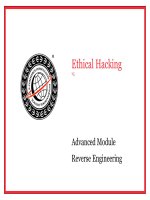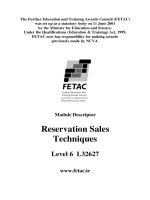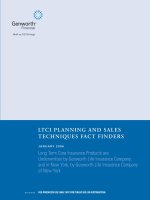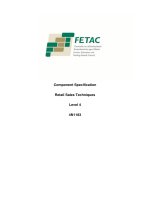Module Descriptor Reservation Sales Techniques Level 6 - L32627 ppt
Bạn đang xem bản rút gọn của tài liệu. Xem và tải ngay bản đầy đủ của tài liệu tại đây (64.14 KB, 15 trang )
The Further Education and Training Awards Council (FETAC)
was set up as a statutory body on 11 June 2001
by the Minister for Education and Science.
Under the Qualifications (Education & Training) Act, 1999,
FETAC now has responsibility for making awards
previously made by NCVA.
Module Descriptor
Reservation Sales
Techniques
Level 6 L32627
www.fetac.ie
Level 6 Module Descriptor
Summary of Contents
Introduction
Describes how the module functions as part of the national
vocational certificate framework.
Module Title
Indicates the module content. This title appears on the learner’s
certificate. It can be used to download the module from the website
www.fetac.ie.
Module Code
An individual code is assigned t
o each module; a letter at the
beginning denotes a vocational or general studies area under which
the module is grouped and the first digit denotes its level within the
national vocational certificate framework.
Level
Indicates where the module is placed in the national vocational
certificate framework, from Level 3 to Level 6.
Credit Value
Denotes the amount of credit that a learner accumulates on
achievement of the module.
Purpose
Describes in summary what the learner will achieve on successfully
completing the module and in what learning and vocational contexts
the module has been developed. Where relevant, it lists what
certification will be awarded by other certification agencies.
Preferred Entry Level
Recommends the level of previous achievement or experience of the
learner.
Special Requirements
Usually ‘none’ but in some cases detail is provided here of specific
learner or course provider requirements. There may also be
reference to the minimum safety or skill requirements that learners
must achieve prior to assessment.
General Aims
Describe in 3-5 statements the broad skills and knowledge learners
will have achieved on successful completion of the module.
Units
Structure the learning outcomes; there may be no units.
Specific Learning
Outcomes
Describe in specific terms the knowledge and skills that learners will
have achieved on successful completion of the module.
Portfolio of Assessment
Provides details on how the learning outcomes are to be assessed.
Grading
Provides details of the grading system used.
Individual Candidate
Marking Sheets
List the assessment criteria for each assessment technique and the
marking system.
Module Results
Summary Sheet
Records the marks for each candidate in each assessment technique
and in total. It is an important record for centres of their candidate’s
achievements.
Appendices
Can include approval forms for national governing bodies.
Glossary of Assessment
Techniques
Explains the types of assessment techniques used to assess standards.
Assessment Principles
Describes the assessment principles that underpin FETAC approach
to assessment.
Introduction
A module is a statement of the standards to be achieved to gain a FETAC award.
Candidates are assessed to establish whether they have achieved the required
standards. Credit is awarded for each module successfully completed.
The standards in a module are expressed principally in terms of specific learning
outcomes, i.e. what the learner will be able to do on successful completion of the
module. The other elements of the module - the purpose, general aims,
assessment details and assessment criteria - combine with the learning outcomes
to state the standards in a holistic way.
While FETAC is responsible for setting the standards for certification in
partnership with course providers and industry, it is the course providers who are
responsible for the design of the learning programmes. The duration, content and
delivery of learning programmes should be appropriate to the learners’ needs and
interests, and should enable the learners to reach the standard as described in the
modules. Modules may be delivered alone or integrated with other modules.
The development of learners’ core skills is a key objective of vocational
education and training. The opportunity to develop these skills may arise through
a single module or a range of modules. The core skills include:
• taking initiative
• taking responsibility for one’s own learning and progress
• problem solving
• applying theoretical knowledge in practical contexts
• being numerate and literate
• having information and communication technology skills
• sourcing and organising information effectively
• listening effectively
• communicating orally and in writing
• working effectively in group situations
• understanding health and safety issues
• reflecting on and evaluating quality of own learning and achievement.
Course providers are encouraged to design programmes which enable learners to
develop core skills.
1
1 Module Title Reservation Sales Techniques
2 Module Code L32627
3 Level 6
4 Credit Value 1 credit
5 Purpose This module is a statement of the standards to be achieved to
gain a credit in Reservation Sales Techniques at Level 6.
The module is designed to enable front office staff to conduct a
professional sales approach to personal selling. The module
focuses on the skills and knowledge required to generate
optimum sales revenue for the hotel.
6 Preferred
Entry Level Level 5 Certificate, Leaving Certificate or equivalent
qualifications and/or relevant life and work experiences.
7 Special
Requirements None.
8 General Aims
Learners who successfully complete this module will:
8.1 understand the significance of the sales process to the overall
marketing communications mix
8.2 acquire the skills to generate sales through a structured sales
process
8.3 demonstrate the skills learned in particular selling situations
8.4 develop an awareness of best practices to optimise all aspects
of the sales process
8.5 acquire the ability to analyse sales statistics for revenue
management.
2
9 Units The specific learning outcomes are grouped into 5 units
Unit 1 Level 3s of Selling
Unit 2 Reservation Sales Process
Unit 3 Applying Sales Techniques to Selling Situations
Unit 4 Optimising the Sales Process
Unit 5 Revenue Management
10 Specific Learning
Outcomes
Unit 1 Foundations of Selling
Learners should be able to:
10.1.1 identify the role of front office personnel in the generation of
sales revenue for the hotel
10.1.2 understand the significance of the sales function in the context
of the overall marketing communications mix
10.1.3 identify the various hotel market segments - conference,
business, leisure etc
10.1.4 develop a comprehensive knowledge base of the hotels product
in terms of the following; bedroom type and variety, pricing
structures, in-house facilities/services and knowledge of locality
region and country as a whole
10.1.5 recognise the hotel’s product as a perishable and intangible
service
10.1.6 develop an awareness of the hotels promotional package such as
mid-week breaks, weekend specials corporate packages etc
10.1.7 recognise the impact of print, broadcast and internet advertising
on sales activity
10.1.8 implement a customer centric approach throughout the sales
process.
10.1.9 describe the structure of an effective Sales Presentation
3
Unit 2 Reservations Sales Process
Learners should be able to:
10.2.1 use a variety of questioning and listening techniques to probe for
relevant information in order to understand fully the customer
requirements
10.2.2 present the hotel product in a manner that highlights services
facilities and USPs
10.2.3 identify any additional opportunities presented by the customer
requirements
10.2.4 acknowledge objections and provide an appropriate answer to
overcome objections
10.2.5 handle objections on price by focusing on non price issues
10.2.6 overcome client resistance if necessary
10.2.7 develop appropriate closing techniques
10.2.8 use a range of tone, pitch and voice modulation in telephone
selling
10.2.9 correspond with clients via email, faxes regarding bookings etc
10.2.10 familiarise oneself with the hotel and agents websites,
brochures, e-flyers and promotional packages.
Unit 3 Applying Sales Techniques to Selling Situations
Learners should be able to:
10.3.1 implement sales skills in initial accommodation enquiries
10.3.2 demonstrate selling skills whilst taking reservations
10.3.3 present further buying opportunities when greeting guests on
arrival
10.3.4 optimise future sales opportunities when presenting bills on
departure
10.3.5 apply selling techniques in all customer contacts/ enquires
10.3.6 ensure all correspondence provides opportunities for
maximising sales
10.3.7 generate further sales during guest stay by providing guests with
information on facilities and services.
4
Unit 4 Optimising the Sales Process
Learners should be able to:
10.4.1 capitalise on all incoming accommodation enquiries
10.4.2 take advantage of all the up-selling opportunities which may
arise
10.4.3 optimise return visits of clients if possible
10.4.4 establish a referral system that guarantees future business
10.4.5 provide clients with a Quality Service throughout the stay
10.4.6 promote midweek promotion packages and off season packages
to increase occupancy
10.4.7 promote special rates such as seniors, golf weekends, etc
10.4.8 create a buying versus order taking environment at front office.
Unit 5 Revenue Management
Learners should be able to:
10.5.1 compare the various measures of occupancy and their benefits
10.5.2 define the terms: Room Occupancy, Sleeper Occupancy and
Income Occupancy
10.5.3 calculate the average room rate
10.5.4 recognise the significance of daily operational reports such as
housekeepers reports, standard room reports and incident book
reports
10.5.5 outline the importance of sales forecasting to other hotel
departments
10.5.6 prepare a daily trading report for management.
11 Portfolio of
Assessment .
All assessment is carried out in accordance with FETAC
regulations.
Assignments devised locally by the internal assessor, with
external moderation by FETAC.
Summary Skills Demonstration 40%
Assignment 1 30%
Assignment 2 30%
5
11.1 Skills
Demonstration In one or more skills demonstrations, candidates will be assessed in
sales techniques in a variety of selling situations from unit 2 (eg
role play/ simulation/work practice) Candidates will be assessed in
the following skills area:
• Client research
• Presentation of hotel
• Communication skills
• Optimising Sales techniques
11.2 Assignment 1 Devise and deliver a 10 minute training programme for the hotel
sales department. Presentation should incorporate the sales
techniques necessary to optimise sales figures for the hotel.
Candidates should include:
• Effective Sales techniques
• The importance of marketing communication
• The role of revenue management
11.3 Assignment 2 Formulate a sales presentation aimed at the corporate market
demonstrating the conference/business facilities of a hotel of
choice. Knowledge of hotel services, facilities and pricing
structures should be demonstrated. The candidate will be required
to deliver a sales presentation of approximately 10 mins duration in
a work or work simulated environment
The assignments may be presented in a variety of media, for
example written, audio, video, graphic, visual or any combination
of these. Any audio or video evidence must be provided on tape
12 Grading
Pass 50 - 64%
Merit 65 - 79%
Distinction 80 - 100%
6
Individual Candidate
Marking Sheet 1
Reservation Sales Techniques
L32627
Role Play/Work simulation 40%
Candidate Name: _______________________________ PPSN: _________________________
Centre: __________________________________________________ Centre No.: __________
Assessment Criteria
Maximum
Mark
Candidate
Mark
Client research
- establishing the guest type
- identifying opportunities to create ultimate guest experience
- identifying all opportunities to up-sell
- establish database of guest history
- identifying special requirements
10
Presentation of hotel
- demonstrate knowledge of bedroom type and variety
- demonstrate knowledge of hotels pricing structures
- inform guest of hotels facilities and services
- demonstrate knowledge of locality/region/country
10
Communication skills
- questioning and listening
- personal presentation, grooming, body language
- acknowledging objections and providing appropriate answers
- recognising buying signals and closing sale
- effective use of voice tone and pitch
- appropriate use of technology-phone, email, database
10
Optimising sales
- implement up-selling skills when opportunities arise
- ensure return visits with special rates
- establish corporate contracts
- initiate client referrals when possible
- promote current promotional packages
10
TOTAL MARKS
This mark should be transferred to the Module Results Summary Sheet
40
Internal Assessor’s Signature: ________________________ Date: ______________________
External Authenticator’s Signature: ______________________ Date: ________________
7
Individual Candidate
Marking Sheet 2
Reservation Sales Skills
L32627
Assignment 1 Sales training 30 %
Candidate Name: _______________________________ PPSN: _________________________
Centre: __________________________________________________ Centre No.: __________
Assessment Criteria
Maximum
Mark
Candidate
Mark
Optimising Sales techniques
- establishing client referral
- recognising up-selling opportunities
- delivering a quality service
- creating corporate contracts
- initiating return visits
Marketing Communications
- identifying hotels target market
- awareness of hotels tv/press/radio advertising
- knowledge of hotel’s internet advertising
- showing awareness of hotel agents advertising
- awareness of hotel’s special promotions/sponsorship
Revenue management
- daily trading reports
- daily operational reports
- measures of occupancy
- importance of sales forecasting
Presentation skills
- use of presentation aids
- interaction with audience
- structure/format of presentation
- effective communication skills
- capturing and sustaining audience attention
10
10
5
5
TOTAL MARKS
This mark should be transferred to the Module Results Summary Sheet
30
Internal Assessor’s Signature: __________________________________ Date: _____________
External Authenticator’s Signature: _____________________________ Date: _____________
8
Individual Candidate
Marking Sheet 3
Reservation Sales Technique
L32627
Assignment 2 Sales presentation 30%
Candidate Name: _______________________________ PPSN: _________________________
Centre : __________________________________________________ Centre No.: __________
Assessment Criteria
Maximum
Mark
Candidate
Mark
Location
- urban, rural, coastal
- Surroundings-landscaped, concrete
- Accessibility-near major motorway, airport
Conference rooms
- number and capacity
- quality-soundproofing, décor, power points
- seating
- PA system –microphone
- projection equipment
Accommodation
- number of rooms and types
- décor, facilities, views
- room service
- bathroom size
- furnishings
Hotel facilities
- business centre with computers, internet, wireless access
- audiovisual equipment
- leisure facilities
- car parking
- quality of public areas
Catering
- quality of food
- speed of service day time
- provision for specialist diets
- variety of food
- provision of coffee/tea breaks during conference
Price
- delegate daily rate
- full conference rates
- accommodation and package rates
- willingness to negotiate
- terms and conditions of payment
5
5
5
5
5
5
TOTAL MARKS
This mark should be transferred to the Module Results Summary Sheet
30
Internal Assessor’s Signature: __________________________________ Date: _____________
External Authenticator’s Signature: _____________________________ Date: _____________
9
FETAC Module Results Summary Sheet
Module Title:
Reservation Sales Techniques
Module Code:
L32627
Assessment Marking Sheets
Mark Sheet
1
Mark Sheet
2
Mark Sheet
3
Total
Marks
Total
÷ ?
100%
Grade*
Maximum Marks per Marking Sheet 40 30 30 100
Candidate Surname Candidate Forename
Signed:
Internal Assessor: _______________________________________________ Date: ____________________
This sheet is for internal assessors to record the overall marks of individual candidates. It should be retained in the centre.
The marks awarded should be transferred to the official FETAC Module Results Sheet issued to centres before the visit of
the external Authenticator.
Grade*
D: 80 - 100%
M: 65 - 79%
P: 50 - 64%
U: 0 - 49%
W: candidates entered who did not present for assessment
Glossary of Assessment Techniques
Assignment An exercise carried out in response to a brief with specific guidelines and
usually of short duration.
Each assignment is based on a brief provided by the internal assessor.
The brief includes specific guidelines for candidates. The assignment is
carried out over a period of time specified by the internal assessor.
Assignments may be specified as an oral presentation, case study,
observations, or have a detailed title such as audition piece, health fitness
plan or vocational area profile.
Collection of
Work A collection and/or selection of pieces of work produced by candidates
over a period of time that demonstrates the mastery of skills.
Using guidelines provided by the internal assessor, candidates compile a
collection of their own work. The collection of work demonstrates
evidence of a range of specific learning outcomes or skills. The evidence
may be produced in a range of conditions, such as in the learning
environment, in a role play exercise, or in real-life/work situations.
This body of work may be self-generated rather than carried out in
response to a specific assignment eg art work, engineering work etc
Examination A means of assessing a candidate’s ability to recall and apply skills,
knowledge and understanding within a set period of time (time
constrained) and under clearly specified conditions.
Examinations may be:
• practical, assessing the mastery of specified practical skills
demonstrated in a set period of time under restricted conditions
• oral, testing ability to speak effectively in the vernacular or other
languages
• interview-style, assessing learning through verbal questioning, on
one-to-one/group basis
• aural, testing listening and interpretation skills
• theory-based, assessing the candidate’s ability to recall and apply
theory, requiring responses to a range of question types, such as
objective, short answer, structured, essay. These questions may be
answered in different media such as in writing, orally etc.
Learner Record A self-reported record by an individual, in which he/she describes
specific learning experiences, activities, responses, skills acquired.
Candidates compile a personal logbook/journal/diary/daily diary/
record/laboratory notebook/sketch book.
The logbook/journal/diary/daily diary/record/laboratory notebook/sketch
book should cover specified aspects of the learner’s experience.
Project A substantial individual or group response to a brief with guidelines,
usually carried out over a period of time.
Projects may involve:
research – requiring individual/group investigation of a topic
process – eg design, performance, production of an artefact/event
Projects will be based on a brief provided by the internal assessor or
negotiated by the candidate with the internal assessor. The brief will
include broad guidelines for the candidate. The work will be carried out
over a specified period of time.
Projects may be undertaken as a group or collaborative project, however
the individual contribution of each candidate must be clearly identified.
The project will enable the candidate to demonstrate: (some of these –
about 2-4)
• understanding and application of concepts in (specify area)
• use/selection of relevant research/survey techniques, sources of
information, referencing, bibliography
• ability to analyse, evaluate, draw conclusions, make
recommendations
• understanding of process/planning implementation and review skills/
planning and time management skills
• ability to implement/produce/make/construct/perform
• mastery of tools and techniques
• design/creativity/problem-solving/evaluation skills
• presentation/display skills
• team working/co-operation/participation skills.
Skills
Demonstration Assessment of mastery of specified practical, organisational and/or
interpersonal skills.
These skills are assessed at any time throughout the learning process by
the internal assessor/another qualified person in the centre for whom the
candidate undertakes relevant tasks.
The skills may be demonstrated in a range of conditions, such as in the
learning environment, in a role-play exercise, or in a real-life/work
situations.
The candidate may submit a written report/supporting documentation as
part of the assessment.
Examples of skills: laboratory skills, computer skills, coaching skills,
interpersonal skills.
FETAC Assessment Principles
1 Assessment is regarded as an integral part of the learning process.
2 All FETAC assessment is criterion referenced. Each assessment technique
has assessment criteria which detail the range of marks to be awarded for
specific standards of knowledge, skills and competence demonstrated by
candidates.
3 The mode of assessment is generally local i.e. the assessment techniques are
devised and implemented by internal assessors in centres.
4 Assessment techniques in FETAC modules are valid in that they test a range
of appropriate learning outcomes.
5 The reliability of assessment techniques is facilitated by providing support
for assessors.
6 Arising from an extensive consultation process, each FETAC module
describes what is considered to be an optimum approach to assessment.
When the necessary procedures are in place, it will be possible for assessors
to use other forms of assessment, provided they are demonstrated to be valid
and reliable.
7 To enable all learners to demonstrate that they have reached the required
standard, candidate evidence may be submitted in written, oral, visual,
multimedia or other format as appropriate to the learning outcomes.
8 Assessment of a number of modules may be integrated, provided the
separate criteria for each module are met.
9 Group or team work may form part of the assessment of a module, provided
each candidate’s achievement is separately assessed.









